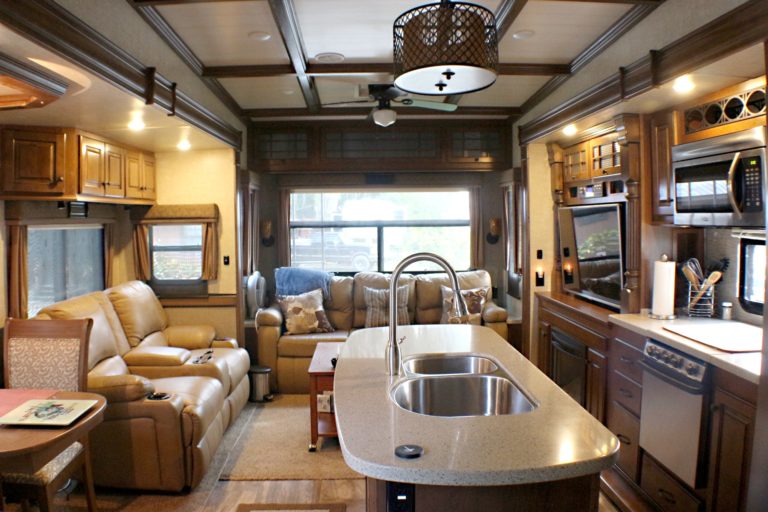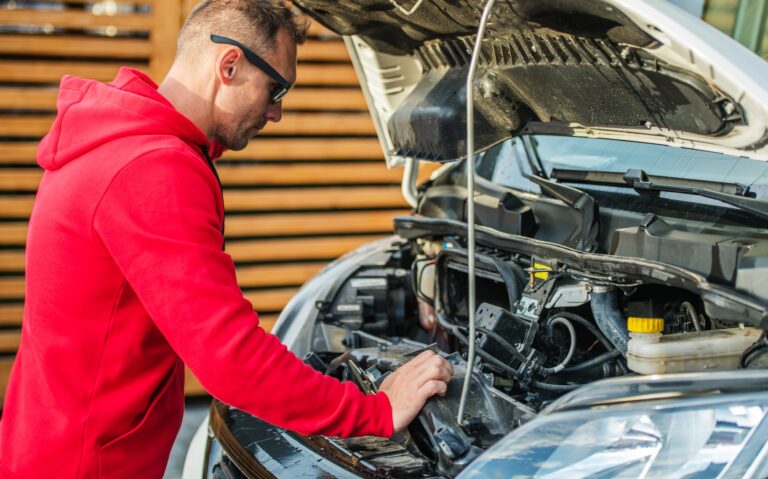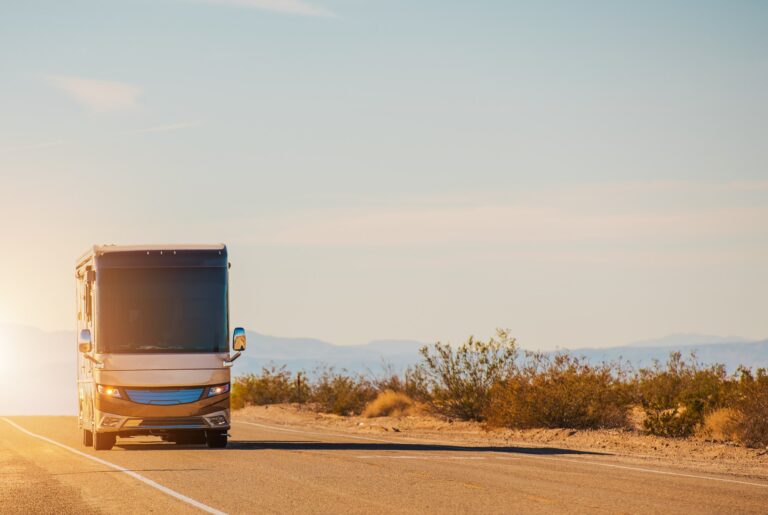Starting on the RV living full-time journey is thrilling. It mixes freedom, exploration, and challenges. Are you eager to break free from a traditional life, or do you crave constant movement? Living in an RV full-time offers endless possibilities but comes with its share of difficulties. This guide will explore the ups and downs of life on the road, helping you decide if it’s the right path for you.
Key Takeaways
- Discover the freedom and adventure of the full-time RV lifestyle.
- Explore the financial benefits and downsizing opportunities of living in an RV.
- Understand the challenges of maintaining connectivity and community on the road.
- Learn how to choose the right RV for your unique needs and preferences.
- Weigh the advantages and disadvantages of the RV living full-time experience.
Embracing the Nomadic RV Lifestyle
Finding joy in the open road and exploring nature is at the heart of the nomadic RV life. This way of living lets you dive into adventure and see the world on your terms. Living in an RV full-time means you can go where you choose and really get in touch with nature.
Unleashing Your Sense of Adventure
The nomad RV life values the trip over the stop. You’ll love the surprise of finding beautiful spots as you drive. Maybe you’ll see amazing sunsets, walk in vibrant forests, or just enjoy nature’s quiet beauty. Full-time RVing lets you enjoy exploring and being okay with what’s next.
Exploring the Great Outdoors
The RV life is perfect for getting close to nature. Places like calm lakes or tall mountains become your backyard. You can stargaze, do water sports, or relax by a campfire. It’s a great way to feel connected to the Earth and its wonders.
“The RV lifestyle allows me to explore the great outdoors in a way I never could have imagined. Every day is a new adventure, and I wouldn’t trade it for anything.”
Living a nomad RV life equals a lot of freedom and joy. It means you get to explore nature and dare to try new things.
Financial Benefits of Full-Time RVing
Choosing to live full-time in an RV can save you a lot of money. This makes it a great option for those who want to lower their living costs. You also get the chance to have more financial freedom. You save money on housing and utility bills, which can really help your finances.
The biggest money-saver in full-time RVing is on housing. Living in an RV means no mortgage payments, property taxes, or home insurance. This saves you a lot of money. You can use this saved money for other goals or to enjoy life more.
Living in an RV cuts down on utility costs too. RVs have small spaces that are quick to heat or cool. This means lower bills for electricity, water, and heating/cooling. Over time, these savings add up nicely.
There are even tax benefits for full-time RVers. Some RV expenses can be tax-deductible. This includes the interest on your RV loan and costs for repairs. These deductions can lower your overall costs.
To make the most of living in an RV, you need a good budget. Consider all costs like fuel, maintenance, insurance, and storage fees. By keeping a close eye on your expenses, you can really enjoy the financial perks.
| Cost Category | Traditional Home | Full-Time RV |
|---|---|---|
| Housing | $1,200 per month | $500 per month |
| Utilities | $300 per month | $150 per month |
| Maintenance | $200 per month | $100 per month |
| Total Monthly Costs | $1,700 per month | $750 per month |
The table shows how much you can save by living in an RV full-time. It breaks down the savings in housing, utilities, and maintenance costs over a traditional home. Embracing the RV life means you get to save money and have more financial flexibility. This allows you to see more of the world while taking care of your finances.
RV Living Full-Time: Pros and Cons
Choosing the RV lifestyle full-time means facing both good and tough parts. Think about the cool things and the problems you might run into. This helps make a smart decision about hitting the road.
Weighing the Advantages and Disadvantages
RVers love the freedom of always being on the go. They get to see amazing places and keep life simple. Plus, they save money by not having to take care of a big house.
But, living in an RV full-time isn’t all easy. Staying connected and finding friends on the road is hard. And, making sure everyone’s healthy while moving a lot takes a lot of work too.
| Advantages of RV Living Full-Time | Disadvantages of RV Living Full-Time |
|---|---|
|
|
Starting a full-time RV life needs careful thought. Make sure the good and the bad of the RV life match what you and your family want. This is key to a happy journey.
“The RV lifestyle offers a unique blend of freedom and challenges. It’s essential to weigh the pros and cons carefully to determine if it’s the right fit for you and your family.”
Downsizing and Minimalist Living
Choosing the RV lifestyle means downsizing your things and living minimalist. This journey will lead you to a clutter-free RV lifestyle. It helps you see the value of having fewer things in a small space.
Getting rid of stuff can feel great. It frees your mind from feeling weighed down by too much stuff. A minimalist mindset means you can move easily, keep things simple, and focus on what truly matters.
Embracing a Clutter-Free Existence
Downsizing for RV living can be hard but also fulfilling. You have to decide what you really need. This lets you clear both your physical and your mental space. Then, you can enjoy the simple joys of minimalist living in an RV.
- Identify the essential items that truly enhance your quality of life and serve your needs on the road.
- Donate, sell, or recycle items that no longer align with your clutter-free RV lifestyle goals.
- Adopt a mindset of mindfulness, focusing on experiences and relationships rather than accumulating possessions.
- Explore multifunctional and space-saving solutions to maximize the limited square footage of your RV.
Taking a minimalist approach brings freedom and flexibility. In your nomadic life, you can move easily, manage your space well, and focus on enriching experiences.
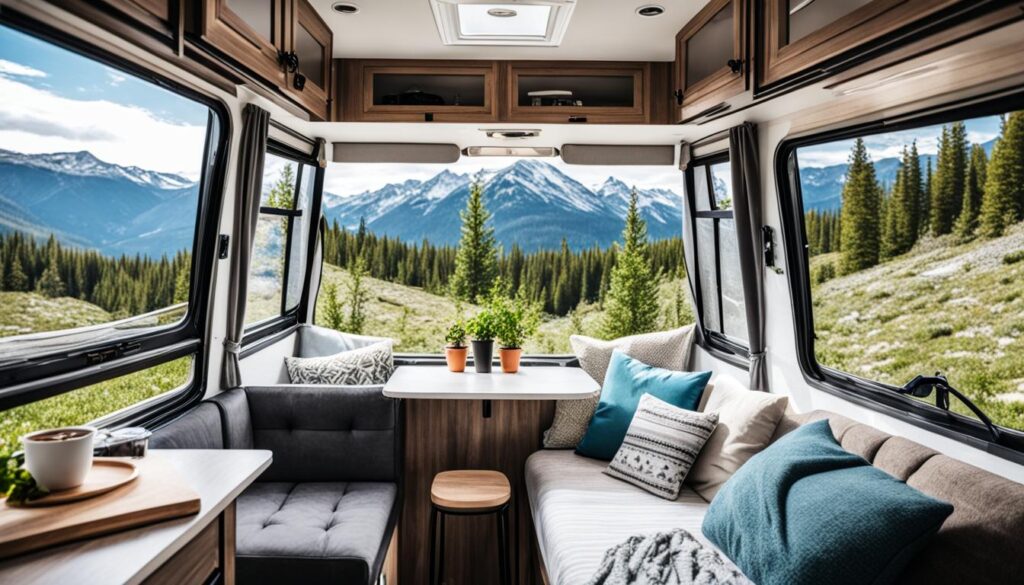
“Living with less doesn’t mean living with nothing. It simply means living with exactly what you need to live life fully.”
Fostering Stronger Family Bonds
Many RV enthusiasts see the RV lifestyle as a way to make their family closer. Living closely, sharing experiences, and facing the road’s challenges together can strengthen ties. It lets families build unity, talk more, and spend quality time together.
The RV life is great for family bonding. In a small space, you end up spending lots of time together and talking. This also helps work through any problems. Being close like this builds better communication and deeper emotional connections.
- Families can create lasting memories by sharing adventures on the road.
- The RV life reduces distractions, giving families more time to spend together.
- Dealing with RV living’s difficulties together boosts resilience and problem-solving skills in families.
Also, the RV life makes people value the simple pleasures in life more. It allows families to leave everyday stress behind and enjoy the now. This boosts their gratitude and emotional closeness.
“The RV lifestyle has brought our family closer together than ever before. We’ve learned to communicate better, solve problems as a team, and truly appreciate the time we have with each other.” – Sarah, full-time RV enthusiast
Ultimately, choosing the RV lifestyle can really strengthen family relations. It involves facing unique challenges and enjoying special moments on the road. By doing so, families can make bonds that will not easily be broken and memories that will last forever.
Challenges of Life on the Road
The RV lifestyle is full of freedom and adventure. But, full-time RVers also face tough challenges. They have to find good campsites, deal with little storage, and handle maintenance problems. These hurdles can really test the grit of even the most experienced RV fans.
Navigating Logistical Hurdles
Finding the right campsites is a big task for full-time RVers. They need to plan routes well and book sites ahead of time. The scarcity of RV spots, especially in busy seasons, adds even more complexity.
Running out of storage space is a common issue in RVs. With not much room to spare, RVers have to be thrifty and choose what they need most. It’s hard for those moving from a house who find it tough to part with things they love.
Keeping an RV in shape is another challenge, especially for newbies. Fixing problems on the go can be stressful and pricey. It means RVers need to know a bit about fixing things or be ready to learn.
| Challenge | Description | Potential Solutions |
|---|---|---|
| Campsite Availability | Finding suitable and available campsites, especially during peak travel seasons |
|
| Limited Storage Space | Adapting to the finite storage capacity of an RV and minimizing possessions |
|
| Maintenance and Repairs | Dealing with mechanical issues and the cost of maintaining an RV |
|
Overcoming these challenges is possible for experienced RVers. They plan, keep things simple, and learn to troubleshoot. This way, they fully enjoy the freedom and adventure the RV lifestyle offers.
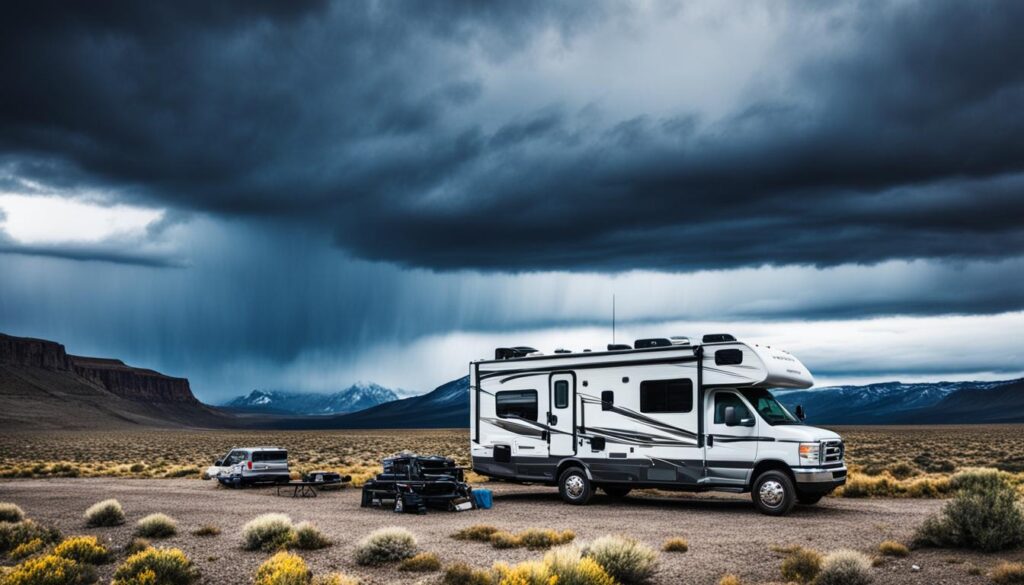
Maintaining Connectivity and Community
Staying connected as a full-time RVer is both rewarding and challenging. It’s key to feel a part of a community and to build strong relationships. Thanks to technology and a wide network of RV enthusiasts, keeping in touch while living on the road is easier than ever.
Staying Connected in a Nomadic Lifestyle
For full-time RVers, technology is a lifeline. High-speed internet and video calls let us stay connected with family, no matter where we are. Social media is also a great way to meet other RVers, share stories, and find support.
But, making friends on the road isn’t just digital. RV parks and rallies are great places to meet new people. Joining community events or offering to help out are ways to make friends and feel part of something bigger.
Feeling like you belong is crucial for happiness and mental health while RVing. By making an effort to connect with others, you can make your journey richer. This brings a sense of togetherness and shared adventures.
“The RV community is more than just a group of people who share a common mode of transportation – it’s a network of individuals who support, inspire, and uplift one another on their journeys.”
In the end, keeping connected and community-building are vital to the RV lifestyle. By using available tools and opportunities, RVers can create deep connections. This makes the nomadic life not just possible but fulfilling.
Health and Wellness on the Move
For full-time RVers, staying healthy can be tricky. But, with the right approach, you can make your well-being a top priority. This lets you enjoy the freedom and adventure of life on the road.
One big issue is healthcare access. You’ll want to find local doctors, urgent care, and telehealth options on your route. This is vital for routine check-ups, managing health conditions, or dealing with emergencies.
Staying active is also key. Whether it’s hiking, bodyweight exercises, or yoga, there are many ways to keep fit while traveling. This keeps your body and mind in good shape.
- Set up a fitness plan that fits your RV lifestyle.
- Look for chances to be outdoors, like hiking or biking.
- Eat well by stocking up on fresh foods and cooking in your RV.
Reducing stress and boosting your mood are important for your health. Take time for things like meditation, writing, or enjoying nature. This helps keep a positive outlook.
“The RV lifestyle is a chance to focus on staying healthy and well. By meeting your health and emotional needs, you can be your best as an RVer.”
Thinking about your health and well-being is crucial for enjoying RV life. Stay on top of your healthcare, stay active, and take care of your mental health. This way, you get the most out of living in an RV.
Budgeting for the RV Lifestyle
Starting your full-time RV adventure requires smart budgeting. The budgeting for RV lifestyle involves planning for costs like fuel, maintenance, and insurance. You also need to think about possible repairs.
Managing Finances on the Road
The main cost for full-time RVers is caring for their mobile home. This means keeping the RV in good shape and improving it as needed. Fuel prices change a lot and this can really affect your finances, especially if you’re traveling widely.
To keep your financial considerations of full-time RVing under control, make a detailed budget. Include areas like camp fees, energy, food, and fun. Watching your spending and adjusting helps you manage finances as a full-time RVer and stay clear of money troubles.
It’s also key to save for emergencies and repairs. Like cars, RVs can break down or need fixes. Saving a bit each month for these surprises helps you not worry when they happen.
| Expense Category | Average Monthly Cost |
|---|---|
| RV Maintenance and Repairs | $200 – $500 |
| Fuel | $400 – $800 |
| Campground Fees | $500 – $1,000 |
| Utilities (water, electricity, internet) | $100 – $300 |
| Food and Groceries | $400 – $800 |
| Healthcare and Insurance | $200 – $500 |
| Entertainment and Miscellaneous | $200 – $500 |
Learn the real costs of the RV life and build a solid budget. This way, your budgeting for RV lifestyle will be reliable and support your full-time travel dreams.
Choosing the Right RV for Your Needs
Starting the RV life is full of excitement, but picking the right home on wheels is vital. It doesn’t matter if you’re new or an expert at RVing. Knowing the different RV types and their features helps in finding what suits you for living on the road full-time.
Exploring RV Types and Features
In the RV world, you’ll find many options, each with unique advantages. You might want a travel trailer that’s easy to pull or a motorhome that feels like a luxury house. Consider things like size, layout, and what they offer to meet your full-time living needs.
| RV Type | Key Features | Best Suited For |
|---|---|---|
| Travel Trailer |
|
Couples or small families seeking a compact and maneuverable RV |
| Fifth Wheel |
|
Families or couples who value ample living space and storage |
| Motorhome |
|
Solo travelers or couples who prioritize mobility and self-sufficiency |
Look closely at the various RV types and what they offer. This way, you’ll find the best one for your needs, making your RV life comfortable and rewarding.
“The perfect RV is the one that fits your lifestyle and allows you to embrace the freedom of the open road.”
Choosing the right RV isn’t just about its size and features. It’s about finding a mobile home that meets your lifestyle, budget, and the needs of full-time RV life. Do your homework, visit different RVs, and test them out. This will help you find the perfect fit.
Conclusion
Exploring the RV lifestyle full-time shows you both the exciting side and the unique challenges. By thinking over the good and the bad aspects, understanding the costs, and looking at the personal side of things, you can decide if the RV life is for you.
Living full-time in an RV is about being free and adventurous but also needing to live with less. You’ll face the road’s challenges and work to stay connected with others. Accepting this life means being open to change and exploration.
The RV lifestyle is special, offering a unique way of living for the adventurous. After thinking about the summary of RV living full-time, you can choose what’s best for your life and dreams. This choice could lead to amazing experiences and a new love for adventure.

